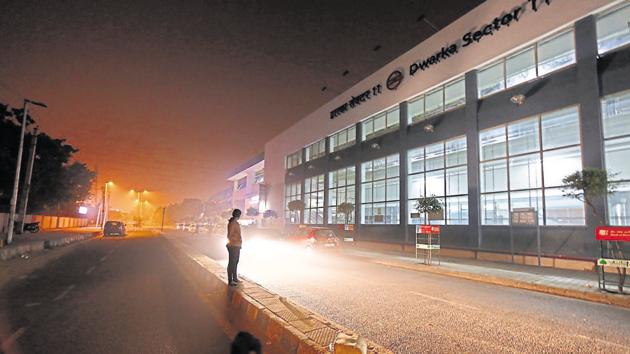Unlit roads a major women’s safety concern in Delhi
A safety audit of Delhi’s roads done by the NGO Safetipin, which is also a women’s safety app, too said the “lighting (on streets) has the maximum impact on the perception of safety”.
When 21-year-old Dhruvika joined seven other women on a walk to explore public spaces at night last month, she was inured to the reaction the group received. Cars still slowed down, men still jeered, and passersby were too close for comfort, as eight women carried on with the five-kilometre-walk around south-east Delhi’s Lajpat Nagar.

“This happens whenever we are out on walks with our friends or are heading back home after watching a late-night movie,” Dhruvika said. The group, Women Walk at Midnight, has been conducting these walks for the past year to “see, hear and feel our city at a time when most of us do not dare to be out”.
Last year on December 16, the group organised a walk on the Saket-Munirka bus route taken by the 2012 Delhi gang-rape victim. While the discourse around women’s safety has grown over the years, women’s rights activists say little has changed on the ground since that fateful December evening.
“Why can’t the city have well-lit streets? That’s the most basic requirement for ensuring safety of all citizens at night, especially women, who prefer to walk to their homes,” said Ranjana Kumari, director of Centre for Social Research and women’s rights activist.
A safety audit of Delhi’s roads done by the NGO Safetipin, which is also a women’s safety app, too said the “lighting (on streets) has the maximum impact on the perception of safety”.
While a large number of women use the city’s public transport, last-mile connectivity is often an issue. Women HT spoke to said that though commute using the Metro is relatively safer, traversing the distance between a Metro station and home after dark is a worry. So, a large number of women prefer to take an auto-rickshaw or taxi to cover the short distance.
Vikaspuri resident Soumya Mathew, who is a Gender Studies student in Jamia Millia Islamia, admitted that though she likes walking, she prefers to take an auto at night while coming back from the nearest Metro station.
“The Metro station is 1.5km away from my house and there is a 750-800 metre-long stretch where there’s no light, a garbage dump and a huge park where men sit and drink. So, I prefer to take an auto,” she said.
However, not everyone has easy access to safer conveyance options for short distances. “For women employed in the informal sector, walking is not a choice but a compulsion, as they can’t afford public transport,” said Shruti Batra, manager of research and policy at Jagori — a group that is working on a project on women’s safety in Bawana industrial area, which employs many female workers.
A majority of women prefer to walk in groups when they come to work or go back home because they don’t feel safe walking alone, Batra said. The situation is the same in several parts of the city where women or school girls prefer to travel in groups. “The fear of harassment in public spaces forces them to move in groups. While there is a need to change the mindset, there is also a need to have more eyes on the streets,” Batra said.
While well-paved, encroachment-free pavements are essential for pedestrians, government agencies should also guarantee safety, especially of women, elderly and children, in the plan for better last-mile connectivity.
In 2018, a coalition of women’s groups also submitted recommendations to the Union ministry of housing and urban affairs on building safer cities for women.
“It is crucial to design public spaces with adequate signage, cycle paths, walkways, with helpline numbers clearly displayed and the availability of visible police assistance, that are also people with disabilities-friendly, and that women and transpersons can access easily,” read one the recommendations.
Women activists say that to make city spaces safer for women there is a need for a comprehensive planning to ensure good physical infrastructure, reorganise informal sectors to ensure more eyes on the streets, build streets for all and not just vehicles. “We lack comprehensive thinking when it comes to issue of women’s safety. Government agencies should consult experts before planning for infrastructure and taking measures for women’s safety,” Kumari said.
The United Nation Women’s global flagship initiative ‘Safe Cities and Safe Public Spaces’, in which New Delhi is a participating city, was launched in 2010 and stresses on identifying and preventing sexual violence against women in public spaces. Nishtha Satyam, Deputy Representative, UN Women Office for India, Bhutan, Maldives and Sri Lanka, said: “It is crucial to note that one in three women are likely to face violence in their lifetimes, and therefore public services, urban planning and transport systems should be planned with women’s safety and mobility in mind. However, women are rarely consulted and are left vulnerable to travelling in unsafe public spaces. Building smart in the 21st century means adopting a gender-responsive approach.”
(with inputs from Risha Chitlangia)




